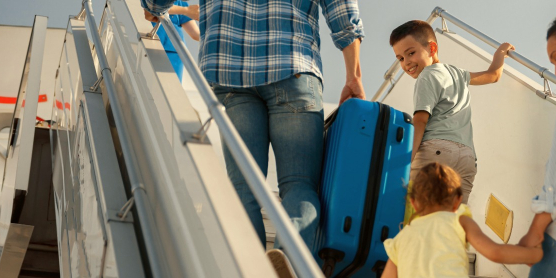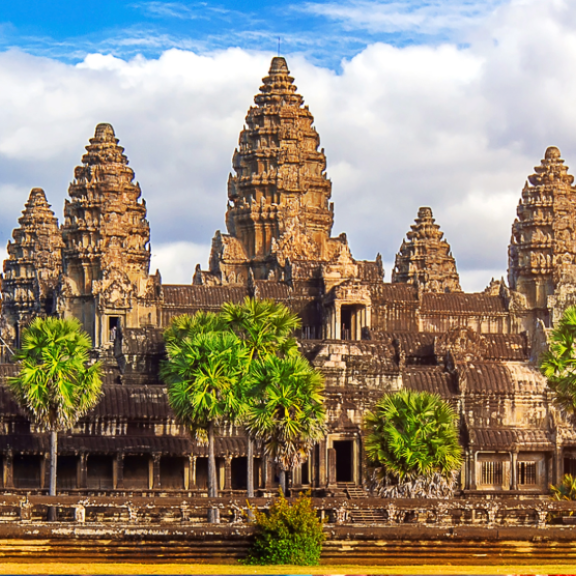
Emigrate to Cambodia
Emigrate to Cambodia: Find out the most important information for your stay here
Emigrating to Cambodia offers the opportunity to immerse yourself in a country with a rich Buddhist culture, friendly people and impressive temples such as Angkor Wat. The tropical climate with hot, humid rainy seasons and a dry season makes the country particularly attractive for sun lovers. The cost of living is low and English is often spoken in cities such as Phnom Penh. However, if you want to emigrate to Cambodia, you should respect local customs and take care of your valuables. Overall, Cambodia is a safe country that has a lot to offer emigrants.
Facts about Cambodia
Capital City
Phnom Penh
Population
17.6 million
Surface Area
69,898 mi² or 181,040 km²
Continent
Asia
Official Language
Khmer
Currency
Riel (KHR)
Emigrating to Cambodia: An overview of the political system
Emigrating to Cambodia means moving to a constitutional monarchy in which the king is the head of state. However, executive power lies with the Prime Minister and the government, while the National Assembly and the Senate together form the parliament. In recent decades, politics in Cambodia has been characterized by the dominance of the Cambodian People's Party (CPP). This party has been the prime minister for many years and has won the majority of seats in parliament in most elections. Anyone wishing to emigrate to Cambodia should familiarize themselves with this political structure and the long-standing influence of the CPP.
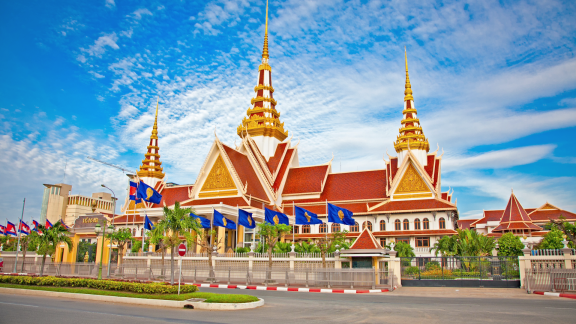
Climate in Cambodia: Important information for emigrants
Emigration to Cambodia should be carried out during the dry season from November to April. During this time there is little rain, the temperatures are more pleasant at an average of 25 to 30 degrees Celsius and the humidity is lower, which makes the climate more bearable. If you want to emigrate to Cambodia, you will find the dry season particularly pleasant. In the rainy season from May to October, however, temperatures often rise above 30 degrees Celsius, accompanied by high humidity and heavy rain showers, which usually occur in the afternoon or evening. Despite the rain, the rainy season has its charm: the landscape is lush and green and the temples are less crowded, offering a quieter atmosphere. So if you want to experience Cambodia's climate, you can enjoy both the dry and rainy seasons, depending on your preferences.
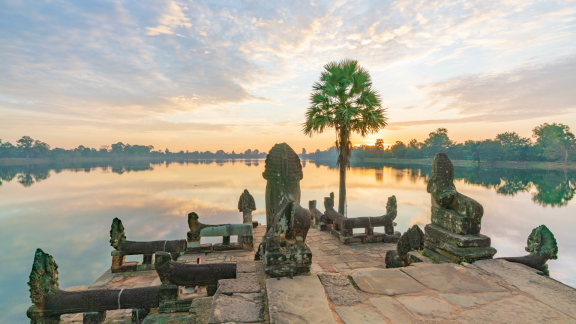
Healthcare system in Cambodia: Important facts for emigrants
The healthcare system in Cambodia includes both public and private facilities. Those wishing to emigrate to Cambodia will find state hospitals and clinics, the quality of which can vary depending on the region. Medical care is better developed in the larger cities, while rural areas often have fewer facilities. In the urban centers, however, there are a growing number of private hospitals and clinics that offer high-quality care.
When emigrating to Cambodia, it is advisable to take out private health insurance that is also valid abroad. It is advisable to find out in advance about recommended vaccinations for Cambodia and to put together a well-stocked first-aid kit with important medicines and bandages. If you don't speak Khmer, you should look for English-speaking doctors and hospitals to ensure smooth communication.

Emigrating to Cambodia: An overview of the economic situation and quality of life
In Cambodia, the gross domestic product per capita amounted to 2,948.03 US dollars in 2024. The Gini coefficient of wealth describes the distribution of wealth. The indicator is an established, internationally comparable measure of wealth inequality. It is measured on a scale from zero to one. The higher the value, the greater the inequality. The Gini coefficient in Cambodia is expected to be 0.27 in 2025 (source: Statista).
Emigrating to Cambodia offers many advantages: The cost of living is significantly lower than in Western countries, especially for accommodation, food and transportation. The people are friendly and helpful, which is particularly pleasant for emigrants. Cambodia impresses with its rich culture, which can be seen in its temples and festivals, as well as its diverse nature, which ranges from jungles to beaches and offers numerous outdoor activities. Anyone wishing to emigrate to Cambodia will find an attractive way of life in the midst of a fascinating environment.
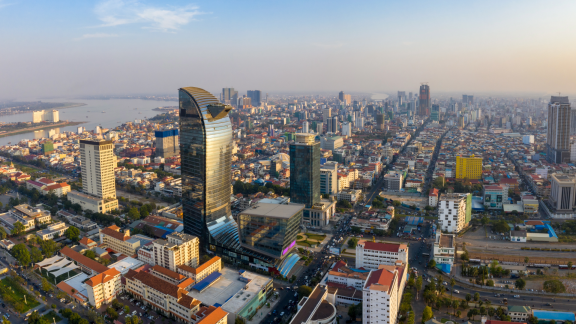
National holiday
Independence from France
This day marks the end of French colonial rule over Cambodia and the beginning of a new era of independence.
Angkor Wat - The temple city of the Khmer
Angkor is famous for its impressive architecture and mystical atmosphere. The temples, which were built by the Khmer in the 9th century, are located in the jungle and are overgrown with mighty strangler figs. Angkor Wat, the most famous temple, is the largest in the world and symbolizes the Hindu world view.
Angkor experienced its heyday in the 12th century, when the city grew into a megacity with more than a million inhabitants. Angkor became internationally famous when the French explorer Henri Mouhot discovered the ruins in 1860. Since then, archaeologists have restored the sites and in 1992 UNESCO declared Angkor a World Heritage Site.
The demise of Angkor remains a mystery. It is suspected that repeated attacks, climate change, disease or earthquakes played a role. The immense upkeep of the huge temple complexes could also have contributed to the decline.
The Cambodian flag shows Angkor Wat as a symbol of national pride and represents courage, purity, justice and the country's faith.
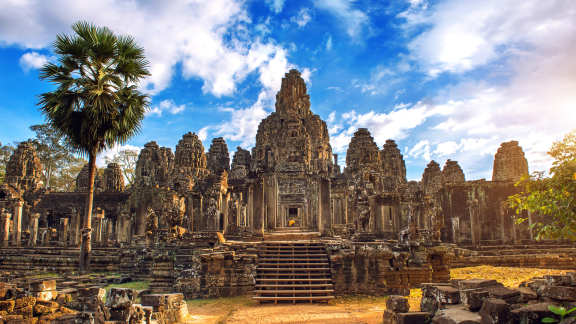
Emigrate to Cambodia- Entry Requirements
Entry is possible for German nationals with the following documents:
- Passport: Yes
- Temporary passport: Yes
- Identity card: No
- Temporary identity card: No
- Children's passport: Yes
Notes/minimum validity:
Travel documents must be valid for at least six months at the time of entry.
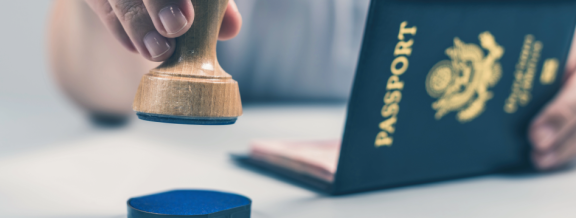
FAQs for emigrating to Cambodia
Where can I find relevant information about my country of entry and the entry regulations that apply there?
We have compiled destination country information as well as entry requirements and customs information for many countries in the Relocation Service section of our website and are constantly expanding this section.
Can I use my own container that I already own for the move with DACHSER & KOLB?
For every removal, which we at DACHSER & KOLB always offer as a door-to-door (full service) removal, a container is rented for the duration of the removal. We therefore do not offer the option of using your own container.
Who is responsible for my move abroad and the services I need there?
As a FIDI member, we work abroad with selected, long-standing partners who work in accordance with our service standards.
Are my removal goods insured in the event of damage?
For every overseas move, we naturally cover transportation insurance at current value for the used household goods and personal belongings
What types of transportation do you offer for overseas relocation?
It is generally possible to carry out overseas removals via air freight or sea freight. In the case of sea freight, it is possible to ship the removal goods as additional cargo (“LCL shipment” with Liftvan) or with a container (FCL shipment in 20 feet, 40 feet or 40 feet high cube). We will be happy to discuss which option is best for you in a personal consultation.
When and how must the move be paid for and what is the payment deadline?
You will receive an invoice a few weeks after placing the order and pay the full amount directly in advance.
Do I have to pay taxes and customs duties on my removal goods?
Removal goods can be imported tax and duty-free into most countries if you have a valid residence permit. We will be happy to check the options for importing the removal goods for your desired destination country in a personal consultation.
Are you interested in moving to Cambodia or another destination country?
Then do not hesitate and contact us today.
Sabrina Klier
Customer Service & Sales - AIR & SEA



